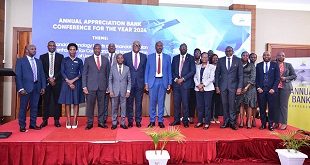
Kampala, Uganda | THE INDEPENDENT | The Supreme Court rejected an appeal by Heritage Oil in the longstanding $435 million tax dispute with the Uganda Revenue Authority.
Heritage Oil had filed an appeal at the Supreme Court seeking to block some of the arguments by the Uganda Revenue Authority in a case before the High Court over the same dispute.
Five Justices in a unanimous decision written by Prof. Lilian Tibatemwa, dismissed the appeal on the grounds that the Supreme Court lacked jurisdiction to handle it.
“I note that what the appellant (Heritage) is seeking to appeal against is an interlocutory order given by the High Court in the exercise of its appellate jurisdiction, and my analysis…this court does not have jurisdiction to entertain such an appeal,” reads part of the judgment dated October 5, 2023.
Heritage and URA have since 2011 been engaged in a legal battle over the $435 million capital gains tax. The tax arose from Heritage’s sale of its oil and gas blocks to Tullow Oil in the Albertine Graben.
Heritage has been pushing for the release of $405 million on deposit with the Uganda Revenue Authority in the escrow account with Standard Chartered Bank.
While the Uganda Revenue Authority seeking to keep the $405 million and an additional $30 million as capital gains tax from the sale. The Tax Appeals Tribunal after that the transaction was taxable and the amount ($434.9m) as assessed by URA.
Heritage Oil was against paying the tax arguing that the transaction was not taxable in Uganda because Heritage was incorporated in The Bahamas and later registered as a tax resident by continuation in Mauritius. Uganda has a double taxation agreement with Mauritius.
The oil firm demanded to settle the tax dispute via the International Court of Arbitration in London which Uganda’s tax body declined and settling for the Ugandan Tax Appeals Tribunal. The Tribunal chaired by Asa Mugenyi ruled that Heritage was liable to pay the tax as assessed.
Dissatisfied by the decision of the tribunal, Heritage Oil made two appeals in the High Court, which were consolidated. During the proceeding in the High Court, presided over by Judge Jane Elizabeth Alividza, Heritage Oil objected to some of the arguments made by Uganda Revenue Authority.
The judge didn’t accept Heritage Oil’s prayers. She directed the parties to prepare their final submission for hearing of the appeal bearing in mind that questions of law not appealed against should be excluded.
“All parties have been given notice of points of law that would be the focus of the appeal and can adequately prepare for their arguments. So at this stage it is sufficient for the hearing of the appeal to start and it will also assist the court if arguments are drafted in the offensive point of law made by TAT (Tax Appeals Tribunal) that are grounds of the appeal. This will enable the appeal to move in a structured manner,” the judge said according to available court records.
Heritage Oil was unsatisfied with this decision and before further proceedings, it filed an appeal to the Court of Appeal seeking to rescind Judge Jane Elizabeth Alividza’s decision.
The Court of Appeal however upheld the High Court’s decision saying that the judge had not heard the main appeal and that she had rather directed the parties at scheduling conference on how to proceed so as to make progress in the appeal.
“It was still open for the Court to consider all the skeleton arguments including the preliminary matters such as whether the points of law, the subject of the appeal were canvassed in terms of the law confining the appeal to only points of law stated in the appellant (Heritage’s) notice of appeal,” Justice Christopher Madrama ruled in the lead judgment.
Justice Madrama further stated that the best approach for Heritage Oil was to ask the court not to consider the portions of URA’s arguments that were offensive. He also added that Heritage had no right to appeal decisions of the High Court sitting on appeal from the decisions of the tax appeals tribunal.
“Such an appeal if held to be valid had to be on the certificate of the high court that it raises matters of law of great public and general importance and there is none in this matter. Thirdly the law doesn’t envisage an appeal from the direction of the learned Judge allowing parties to submit on their skeleton arguments and declining to strike out portions thereof,” Madrama added describing the appeal as incompetent before dismissing it with costs.
Heritage Oil was again not satisfied with the Court of Appeal Decision. It lodged another appeal to the Supreme Court. Heritage’s lawyers asserted that the Justices of Court of Appeal made errors in concluding that there was no right of appeal from the High Court’s decision in a Tax Appeals Tribunal matter.
Heritage also challenged the characterization of their appeal as a third appeal, requiring a certificate of importance under section 73 of the CPA, and also contested the Court of Appeal’s stance that there’s no legal provision for striking out contentious submissions.
Heritage asked the Supreme Court to overturn the Court of Appeal’s judgment, permitting their preliminary points and the removal of URA’s arguments in the case before the High Court.
In the ruling, the Justices of the Supreme Court firmly upheld the Court of Appeal’s decision, emphasizing that the statutory provisions at the time of the appeal unequivocally indicated that there was no entitlement to appeal interlocutory decisions made by the High Court.
Prof Tibatemwa observed that while there have been amendments to allow appeals to the Court of Appeal and Supreme Court from tax disputes, this was only effected after the Court Of Appeal had delivered its decision.
“I am alive to the fact that section 27B of the Tax Appeals Tribunal Amendment Act 2021 now allows appeals to the Court of Appeal and Supreme Court from tax disputes as of right. The amendment came into effect on July 1st 2021. This was approximately a year after the Court of Appeal had delivered its decision in the matter before us. It is trite that statutory law does not apply retrospectively unless the statute by express words or necessary implication states so. Consequently, the said amendment does not apply to the instant appeal,” Prof Tibatemwa added.
*****
URN
 The Independent Uganda: You get the Truth we Pay the Price
The Independent Uganda: You get the Truth we Pay the Price


